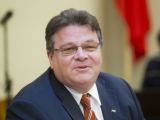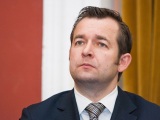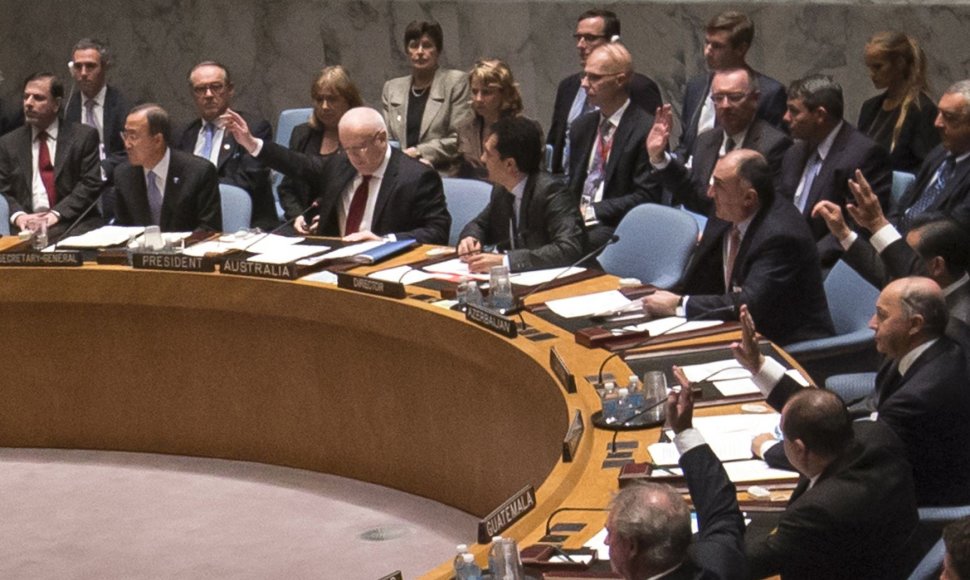True, analyst are cautious when it comes to making predictions about the outcome of the elections in mid-October and whether this time Lithuania will be more successful than last year, when its candidate for chairman of the UN General Assembly, Dalius Čekuolis, was voted down in favour of a last-minute contender, Serbian Foreign Minister Vuk Jeremić.
Lithuania to replace Azerbaijan
Lithuanian Foreign Minister Linas Linkevičius, who went to a UN General Assembly session in New York last week, spent some time talking to his colleagues from countries like Canada, Singapore, Côte d'Ivoire, Senegal, Trinidad and Tobago, Saint Kitts and Nevis, trying to gather support for Lithuania's candidacy.
 |
| Linas Linkevičius |
The voting will take place on 17 October. In order to get into the Security Council, a candidate country must be endorsed by at least two thirds of the votes. Assuming that all 193 members of the United Nations will take part in the voting, Lithuania must gather at least 129 votes.
In all, the UN Security Council (UNSC) comprises of 15 members. Five of them are permanent – the US, the UK, France, China, and Russia – while the rest are elected by the General Assembly for two-year terms with five members replaced each year.
Membership in the UN Security Council is allocated to regions. Lithuania seeks to replace Azerbaijan which currently represents Eastern Europe. Two new members will also be elected to represent Africa, replacing outgoing Morocco and Togo, one for Asia-Pacific (Pakistan), one for Latin America and the Caribbean (Guatemala).
The Eastern European spot was also luring Georgia, but the Caucasian country withdrew its candidacy last spring, due to diplomatic and financial reasons.
Lithuania has never been in the UN Security Council. If successful, it will be the first Baltic state to join the body. The first time that Lithuania intimated it wanted the honours was in 1996. In 2001, Lithuania was preparing to join the European Union and therefore decided to postpone the UNSC bid. Then several years ago, addressing the UN General Assembly, President Dalia Grybauskaitė indicated Lithuania's wish to join the UNSC in 2014-2015.
Back then, Grybauskaitė noted Lithuania's experience in making a peaceful political transition, in building a state and implementing key reforms. Moreover, the country chaired the Organization of Security and Cooperation in Europe (OSCE) in 2011. “This confirms that Lithuania is ready to take on a global responsibility and contribute to security in the entire world,” President Grybauskaitė said.
The importance of the Russian voice
Ramūnas Vilpišauskas, director of the International Relations and Political Science Institute of Vilnius University, comments on Lithuania's prospects cautiously. According to him, it takes a lot of homework to win the election, secure support of many states. Vilpišauskas says he has not heard much about Lithuania's efforts over the past few months.
 |
| prof. Ramūnas Vilpišauskas |
“Other countries' motives, unrelated to these elections, can come into play, too,” Vilpišauskas tells 15min.lt. “So far, it's hard to make predictions. Our goal is to do everything that is in the power of Lithuanian institutions. However, unforeseen circumstances can intervene.”
He says that Lithuania must work hard not only to get into the UNSC, but also afterwards, in order to make good use of the position.
“Being in the UN Security Council is significant to the extent that the UN itself is significant. The debate on this has been raging for years, yet it is the main organization solving issues among countries, one with most members in the world and bringing countries with different political systems. It is an important organization.
“Membership in the UNSC could bring Lithuania more visibility and add more weight to proposals by Lithuanian representatives and diplomats, although there would be little tangible advantage.”
Lithuania's recent presidency over the OSCE and the EU Council might give the country an edge. “We have the capacity, especially in our diplomatic corpse, although when it comes to domestic issues that are relevant to the EU as well, like energy, internal politics and election cycles come into play,” Vilpišauskas says. “Sometimes Lithuania looks bad from the outside, some particular projects smear its reputation. Traditionally, foreign policy is more about security. Maybe Lithuanian politicians have a stronger agreement on that, which makes work for diplomats a whole lot easier.”
According to Vilpišauskas, Russia's position can be significant during the vote: “It is an important permanent member of the Security Council, so its vote is not just significant, it is critical, because it can draw supporters. I would not rule out such a prospect [of losing the vote due to Russia's “no”].”
China is another permanent member which has a powerful voice not just in Asia, but in Africa, too. Beijing was somewhat irritated by a recent visit to Lithuania by the Dalai Lama, who held a private meeting with the Lithuanian president. Other high state officials largely snubbed the Tibetan guest. Was it an attempt to appease Beijing in the run up to the UN vote? Vilpišauskas says that the two issues should not be confounded, although that could be one of the possible explanations.
Liberal MP Dalia Kuodytė, chair of the parliamentary Support for Tibet group that organized the Dalai Lama's visit, is also reluctant to draw a direct link between the cold reception for Tibet's spiritual leader and the forthcoming vote in the UN.
“I do not care that much about it any more. The visit went smoothly, in spite of all the domestic and international political intrigues,” she tells 15min.lt. “We will see how it goes. China's reaction is similar after every visit of His Holiness in all countries. Some say there are consequences, some say there are none. Everyone's playing their political games, what can you do about it?”
Linas Linkevičius: Diplomats work hard to present Lithuania's candidacy
According to Foreign Minister Linkevičius' comments to the Lietuvos Žinios daily, the country's diplomats are putting much effort into swaying UN members to support Lithuania's bid, especially in regions where it has fewer contacts.
So far, he says, Lithuania has a strong support of the Baltic and Nordic States as well as other EU countries. “We are working intensively with other countries and have already secured quite many pledges, in one form or another, to support Lithuania's bid. I would also like to add that such information is treated with a degree of discreetness in the diplomatic circles,” the minister noted.
If Lithuania succeeds in getting elected to the UNSC, just like any other member it will have to concentrate on specific goals of peace and security in particular regions or on the global scale. However, Vilnius would like to dedicate more effort to making sure that the voice of small countries is heard in global security matters, to work towards greater transparency and efficiency in the UN.
“We care about protecting civilians, especially women and children, ensuring their rights in conflict zones. Certainly, issues like security, economic and social development, arms control and the threat of weapons of mass destruction, climate change, energy security are also within our focus,” Linkevičius explained.
Convening since 1946
The UN Security Council is one of the six key organs of the United Nations. It is in charge of maintaining international peace and security, developing friendly relations among nations, promoting and upholding human rights.
The first session of the UNSC took place in London in 1946. Since then, the venues had changed several times until the organization settled in the UN headquarters in New York. The UNSC works throughout the year and can be called at any time. The council is chaired by one of its members, rotating every month alphabetically.
The permanent members of the UNSC are five nations that have had the most powerful military capacities since World War Two and account for some 60 percent of the global military spending.
Japan and Brazil have held the non-permanent membership in the UNSC most frequently, 20 times each. India has been selected 17 times, Colombia and Pakistan, 14.













